Blind loyalty that caused Gwanda’s real blindness
As I write this article, Gwanda is lying in state inside his
hilly-side Chinyanje residence styled “Zuwere” Palace. I can confirm
that he is indeed and truly gone.
“Indeed” and “truly” have been boldly decorated to affirm that this is
not another death hoax. Gwanda had become a common candidate for death
hoaxes. I have documented Gwanda’s 17 death hoaxes elsewhere.
 Strangely, he enjoyed reciting and reading them quite often than the
political particles of his life. Of all death hoaxes, there is one which
even his major mentor and idol -that is Kamuzu – also came to believe. It was a death hoax which is tied to his “blind” loyalty to Kamuzu.
The “blind” loyalty that led to Gwanda’s real physical blindness. The
loyalty that he never regretted on its negative consequences.
Strangely, he enjoyed reciting and reading them quite often than the
political particles of his life. Of all death hoaxes, there is one which
even his major mentor and idol -that is Kamuzu – also came to believe. It was a death hoax which is tied to his “blind” loyalty to Kamuzu.
The “blind” loyalty that led to Gwanda’s real physical blindness. The
loyalty that he never regretted on its negative consequences.


 The context of the hoax was the 1964 cabinet crisis. Soon after Kamuzu got a vote of confidence from the parliament, Albert Muwalo and Gwanda were sworn in as ministers replacing the “rebels”.
The context of the hoax was the 1964 cabinet crisis. Soon after Kamuzu got a vote of confidence from the parliament, Albert Muwalo and Gwanda were sworn in as ministers replacing the “rebels”.
There were several violent fracases. The dropped ministers had their own gangs that were in support of what they were doing. There was the Mangochi gang which was behind Chipembere and the wailers. This was the group to watch out for.
The cabinet crisis brought the two dangerously ambitious politicians close to each. Muwalo and Gwanda had nothing in common except their total loyalty to and perhaps violent defense of Kamuzu, their quasi-god.
To the two gentlemen, nothing was more important, not even their lives nor wives, than Kamuzu. Any task delegated by Kamuzu had to be religiously and meticulously undertaken even if it meant bruising a few skulls along the way.
However, besides their ruthless loyalty, the two differed sharply and as I have cited in Gwanda’s Autobiography, the two worked throughout their way to Kamuzu at the expense of their relationship.
For starters, Albert Muwalo was a Ngoni politician who vented out his anger on the colonial government refusal to grant him a £10-study loan to thousands of Malawians between 1964 and his execution in 1978. Muwalo terrorized opponents and friends alike. In the political history of Malawi, Muwalo comes second on the list of once-most-powerful-and-feared-politicians.
If Muwalo visits your wife at home in your absence (as a husband)
during work hours and you love your life, the most noble thing you could
do was to stay in your office and wait for a word on whether he is done
or not. And taking your wife to task thereafter was as worse as
committing suicide since the soft penalty you could get was an early
dispatch to your maker.
Obviously and expectedly Muwalo and Gwanda had their several bouts later after the cabinet crisis. The shortest bout I can quickly paste here revolved around Kamuzu’s niece called Rosemary. Politicians in the world have a natural hobby of hooking up an extra one besides their official wives. Gwanda did this too and even went beyond to the extent of going out with Rosemary, Kamuzu’s niece at the climax of his closeness to Kamuzu. By this time, Muwalo had already labeled Gwanda as his biggest threat and for many years, he tried to find ways of dealing with Gwanda.
But one day, Muwalo was lucky as he came across -courtesy of Focus Gwede, the most feared Intelligence Chief ever produced by Malawi – details of Gwanda’s affair with Rosemary. Muwalo reported Gwanda to Kamuzu. Rosemary, intimated to Gwanda that her Uncle, Kamuzu had discovered about their affair. When Kamuzu learnt about it, he grew cold towards Gwanda never interacted frequently with him. Gwanda knew that he was finished as I he was no longer getting delegated tasks as had been the case before.
One day, Kamuzu went to Kasungu on a crop inspection tour and his next destination was Mangochi, Chikokobay State House. Gwanda was part of the delegation and while in Kasungu, it had become clear to Gwanda that his days were indeed numbered and the maximum he could last was 7 days. He needed to find a way of saving himself. Gwanda was so confused but he did what many people would do when faced with any danger: consulting the elders. He consulted Sydney Benson Somanje, fondly called SB, the then MCP Treasurer General and revealed to him everything about his affair with Rosemary.
Somanje, an elderly (born in 1908) but respectable man like Lali Lubani, was honesty with Gwanda. He told him that he had treaded on dangerous path. He however gave him a piece of tactic that needed to be done quickly for Gwanda was convinced that as soon as Kamuzu returned to Sanjika, the first radio announcement made would be about his dismissal and possibly his arrest.
The tactic involved Gwanda writing a letter to Kamuzu, “informing” him of his affair with Rosemary and asking Kamuzu for his “blessing” to marry his niece, Rosemary. Gwanda gave the letter to Cecelia Kadzamira with another confession that the letter was from himself and Rosemary. Mama Kadzamira smiled at Gwanda and whispered to him that he was a clever man. When Kamuzu got the letter, he met Gwanda and gave him a formal response on his “request” to marry Rosemary. He told him that he wouldn’t recommend his niece to him because in his view Rosemary was promiscuous as he had several other boyfriends.
Secondly, knowing Gwanda’s paternal culture, Kamuzu thought that Rosemary was not going to be a good wife as she appeared feministic. Finally, Kamuzu told Gwanda that marrying his niece would be interpreted as if it was Kamuzu who arranged the marriage deal and since Gwanda was already married and with Rosemary feminist disposition, he would have to divorce his first wife – something Kamuzu didn’t want. Thus via the meeting, Gwanda was saved from the dismissal.
 However, Gwanda’s next assignment was to face-off Muwalo, for he knew that Muwalo was the one who had reported it to Kamuzu. He drove to Muwalo’s office where the two exchanged blows and words freely.
However, Gwanda’s next assignment was to face-off Muwalo, for he knew that Muwalo was the one who had reported it to Kamuzu. He drove to Muwalo’s office where the two exchanged blows and words freely.
Sorry I digressed a lot but as earlier hinted, the revolt of the ministers made Muwalo and Gwanda to come closer to each than before. A day after a debate on the motion of confidence in Kamuzu, the two travelled together to Zomba for a meeting with the Governor General Jones. But what they didn’t know was that we were all marked and were top on the most wanted list of the opponents gang – Chipembere Army.
After the meeting with Jones, on their way back the two could feel that their our lives were in danger. Muwalo instructed his driver to maximize the work of the speedometer. The plan was to drive straight to Blantyre to hide. However, they felt that Zomba Hospital was the closest convenient location. Muwalo had worked at Zomba hospital at one time in his medical career and he knew the place would serve as a perfect hiding place. As theye were driving fast towards their destination they found the road blocked with a tree trunk and there was no way they could have gotten through with the car. They had a few options especially considering the little time we had to act. They decided to abandon the car and head for the bush that was beside where the car had stopped.
They managed to find their way to the general hospital but at this point the crowd was almost catching up on them. They got in through one of the wards and with the experience and familiarity that Muwalo had with the hospital, he immediately removed his shirt and jumped in one of the sick empty beds that was in the wards and hid there. The plan was to give the illusion that he was one of the sick people in the ward. Gwanda thought that this was very risky and continued to run in search of a perfect hiding place. With every passing second that he spent trying to decide where to run and hide, the gang seemed to catch up with him.
He managed to find a house that he judged could serve the purpose. He entered and hid there but it was too late. Just as he decided to run away again, the crowd caught him up and beat him mercilessly. So much for the unbeaten son of the Shire Valley. He tried to fight back but the crowd usually does not take stock of the where one is from before they can launch brows.
So the son of Shire Valley was on the ground, under the feet of people from any part of country, it didn’t matter. He passed out and was left almost lifeless. Well the plan was to kill him and when he passed out the mob must have thought they had managed to render his body incapable of containing the life within it. The mob left in search of Muwalo. There were deep cuts at Gwanda’s back and above his left eye lid. The left eye was heavily stabbed and thats how he lost its full sight then making him a one-eyed man until his true death three days ago.
A wise decision it turned out to run and hide at the hospital, for when the mob had left, the medical staff at the hospital quickly put him in an ambulance for Queens’s hospital in Blantyre for his protection from the mob as well as for treatment. He had been badly injured and if they were not going to get me some immediate help he was not going to make it. He was going to die. That would have marked the end Gwanda. They made it to Queens and was given a bed in the maternity ward. They had to protect him and make sure no one was still looking to finishing him off.
 While he was there, everybody thought he was dead, even his people
from the Shire Valley thought he had not survived the attack. Kamuzu heard of his attack and was even told that Gwanda was dead. Kamuzu was still in the central region during this time. When Kamuzu
was coming back from the central region, Gwanda went to welcome him at
Liwonde with a bandage still wrapped around his head. Although this area
was very dangerous as a lot of the supporters for the dropped ministers
were from this belt. But surviving the incident with the mob
eliminated all the fear he had.
While he was there, everybody thought he was dead, even his people
from the Shire Valley thought he had not survived the attack. Kamuzu heard of his attack and was even told that Gwanda was dead. Kamuzu was still in the central region during this time. When Kamuzu
was coming back from the central region, Gwanda went to welcome him at
Liwonde with a bandage still wrapped around his head. Although this area
was very dangerous as a lot of the supporters for the dropped ministers
were from this belt. But surviving the incident with the mob
eliminated all the fear he had.
***********************************************************************************************************************
As I grapple with the reality of Gwanda’s death, I have come to conclude that his blind loyalty to Kamuzu and his own inner convictions had a price and prize. The price was his partial blindness, loss of property, imprisonment and partly destitution. However, his blind loyalty also earned him a prize and that was his “Mbuya” magic. Gwanda was unanimously decorated with the “Mbuya” title, the most prestigious title and highest honour in Sena culture.
This is not synonymous to the “mbuya” title associated with old age. Gwanda has been the sole holder of this title and honor for decades. The distant-close one can come to this title is the “Ba” accolade with big “B”. Again only two or three sons of the Valley seem to have attained this. While the “Ba’ title is associated with wealth and philanthropy, the “Mbuya” title has some religious and sacred respects.
A “Mbuya” is in a way a ceremonial god who should be followed without questions. This might explain why Gwanda had managed within four decades to lead people of Shire Valley from Nyasaland African Congress, to MCP, UDF, MCP again, RP, and then DPP. Political scientist call this politics of patronage. But the “Mbuya” phenomenon defies the patronage concept since followers in the “Mbuya” equation do not do so for any monetary or material reward. However, whereas to many, he was the “Mbuya” and consequently sacred, he was to me a closest friend. I was privileged to be one of his closest friends in his last three years. As a close friend he duly opened up for his innermost exciting and even dirty secrets of his political journey.
The Rosemary saga summarized in this tribute is one of the dozens funny, scary, and humorous episodes Gwanda asked me to share with his admirers and enemies in his autobiography. RIP My Good Friend Gwanda! I had a feeling the last handshake we had four days ago was our farewell. You couldn’t release my hand!
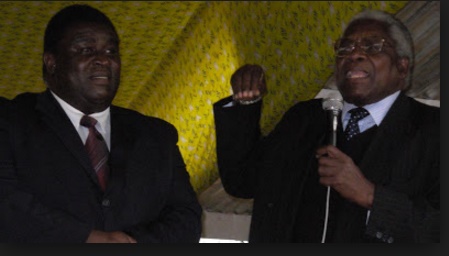
Ken Zikhale Ng’oma (left) and Gwanda Chakuamba in good old days addressing a UDF political rall
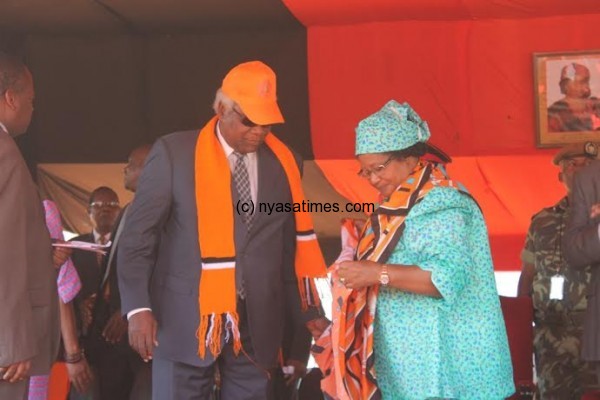
Chakuamba being decorated by former president Banda in PP regalia
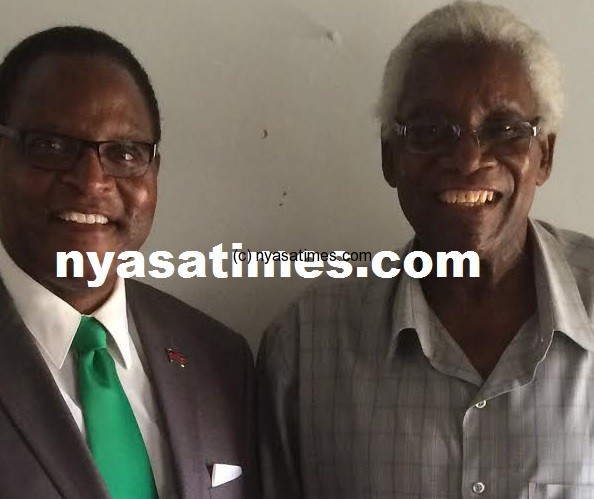
MCP president Lazarous Chakwera and Chakuamba (right)
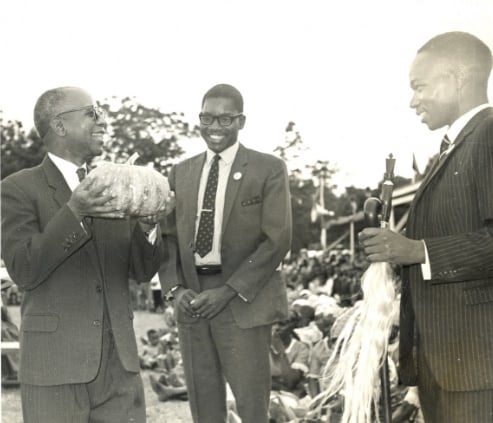
Kamuzu Banda with Gwanda Chakuamba and Aleke Banda admiring crop
There were several violent fracases. The dropped ministers had their own gangs that were in support of what they were doing. There was the Mangochi gang which was behind Chipembere and the wailers. This was the group to watch out for.
The cabinet crisis brought the two dangerously ambitious politicians close to each. Muwalo and Gwanda had nothing in common except their total loyalty to and perhaps violent defense of Kamuzu, their quasi-god.
To the two gentlemen, nothing was more important, not even their lives nor wives, than Kamuzu. Any task delegated by Kamuzu had to be religiously and meticulously undertaken even if it meant bruising a few skulls along the way.
However, besides their ruthless loyalty, the two differed sharply and as I have cited in Gwanda’s Autobiography, the two worked throughout their way to Kamuzu at the expense of their relationship.
For starters, Albert Muwalo was a Ngoni politician who vented out his anger on the colonial government refusal to grant him a £10-study loan to thousands of Malawians between 1964 and his execution in 1978. Muwalo terrorized opponents and friends alike. In the political history of Malawi, Muwalo comes second on the list of once-most-powerful-and-feared-politicians.
Obviously and expectedly Muwalo and Gwanda had their several bouts later after the cabinet crisis. The shortest bout I can quickly paste here revolved around Kamuzu’s niece called Rosemary. Politicians in the world have a natural hobby of hooking up an extra one besides their official wives. Gwanda did this too and even went beyond to the extent of going out with Rosemary, Kamuzu’s niece at the climax of his closeness to Kamuzu. By this time, Muwalo had already labeled Gwanda as his biggest threat and for many years, he tried to find ways of dealing with Gwanda.
But one day, Muwalo was lucky as he came across -courtesy of Focus Gwede, the most feared Intelligence Chief ever produced by Malawi – details of Gwanda’s affair with Rosemary. Muwalo reported Gwanda to Kamuzu. Rosemary, intimated to Gwanda that her Uncle, Kamuzu had discovered about their affair. When Kamuzu learnt about it, he grew cold towards Gwanda never interacted frequently with him. Gwanda knew that he was finished as I he was no longer getting delegated tasks as had been the case before.
One day, Kamuzu went to Kasungu on a crop inspection tour and his next destination was Mangochi, Chikokobay State House. Gwanda was part of the delegation and while in Kasungu, it had become clear to Gwanda that his days were indeed numbered and the maximum he could last was 7 days. He needed to find a way of saving himself. Gwanda was so confused but he did what many people would do when faced with any danger: consulting the elders. He consulted Sydney Benson Somanje, fondly called SB, the then MCP Treasurer General and revealed to him everything about his affair with Rosemary.
Somanje, an elderly (born in 1908) but respectable man like Lali Lubani, was honesty with Gwanda. He told him that he had treaded on dangerous path. He however gave him a piece of tactic that needed to be done quickly for Gwanda was convinced that as soon as Kamuzu returned to Sanjika, the first radio announcement made would be about his dismissal and possibly his arrest.
The tactic involved Gwanda writing a letter to Kamuzu, “informing” him of his affair with Rosemary and asking Kamuzu for his “blessing” to marry his niece, Rosemary. Gwanda gave the letter to Cecelia Kadzamira with another confession that the letter was from himself and Rosemary. Mama Kadzamira smiled at Gwanda and whispered to him that he was a clever man. When Kamuzu got the letter, he met Gwanda and gave him a formal response on his “request” to marry Rosemary. He told him that he wouldn’t recommend his niece to him because in his view Rosemary was promiscuous as he had several other boyfriends.
Secondly, knowing Gwanda’s paternal culture, Kamuzu thought that Rosemary was not going to be a good wife as she appeared feministic. Finally, Kamuzu told Gwanda that marrying his niece would be interpreted as if it was Kamuzu who arranged the marriage deal and since Gwanda was already married and with Rosemary feminist disposition, he would have to divorce his first wife – something Kamuzu didn’t want. Thus via the meeting, Gwanda was saved from the dismissal.
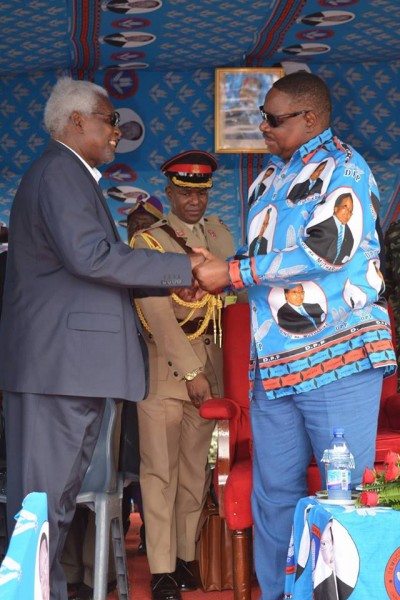
Chakuamba meets President Mutharika
Sorry I digressed a lot but as earlier hinted, the revolt of the ministers made Muwalo and Gwanda to come closer to each than before. A day after a debate on the motion of confidence in Kamuzu, the two travelled together to Zomba for a meeting with the Governor General Jones. But what they didn’t know was that we were all marked and were top on the most wanted list of the opponents gang – Chipembere Army.
After the meeting with Jones, on their way back the two could feel that their our lives were in danger. Muwalo instructed his driver to maximize the work of the speedometer. The plan was to drive straight to Blantyre to hide. However, they felt that Zomba Hospital was the closest convenient location. Muwalo had worked at Zomba hospital at one time in his medical career and he knew the place would serve as a perfect hiding place. As theye were driving fast towards their destination they found the road blocked with a tree trunk and there was no way they could have gotten through with the car. They had a few options especially considering the little time we had to act. They decided to abandon the car and head for the bush that was beside where the car had stopped.
They managed to find their way to the general hospital but at this point the crowd was almost catching up on them. They got in through one of the wards and with the experience and familiarity that Muwalo had with the hospital, he immediately removed his shirt and jumped in one of the sick empty beds that was in the wards and hid there. The plan was to give the illusion that he was one of the sick people in the ward. Gwanda thought that this was very risky and continued to run in search of a perfect hiding place. With every passing second that he spent trying to decide where to run and hide, the gang seemed to catch up with him.
He managed to find a house that he judged could serve the purpose. He entered and hid there but it was too late. Just as he decided to run away again, the crowd caught him up and beat him mercilessly. So much for the unbeaten son of the Shire Valley. He tried to fight back but the crowd usually does not take stock of the where one is from before they can launch brows.
So the son of Shire Valley was on the ground, under the feet of people from any part of country, it didn’t matter. He passed out and was left almost lifeless. Well the plan was to kill him and when he passed out the mob must have thought they had managed to render his body incapable of containing the life within it. The mob left in search of Muwalo. There were deep cuts at Gwanda’s back and above his left eye lid. The left eye was heavily stabbed and thats how he lost its full sight then making him a one-eyed man until his true death three days ago.
A wise decision it turned out to run and hide at the hospital, for when the mob had left, the medical staff at the hospital quickly put him in an ambulance for Queens’s hospital in Blantyre for his protection from the mob as well as for treatment. He had been badly injured and if they were not going to get me some immediate help he was not going to make it. He was going to die. That would have marked the end Gwanda. They made it to Queens and was given a bed in the maternity ward. They had to protect him and make sure no one was still looking to finishing him off.
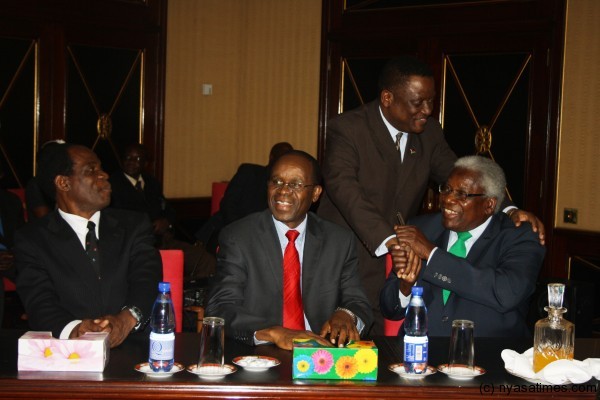
Politician Khwauli Msiska hugs Gwanda Chakuamba at Kamuzu Palace
***********************************************************************************************************************
As I grapple with the reality of Gwanda’s death, I have come to conclude that his blind loyalty to Kamuzu and his own inner convictions had a price and prize. The price was his partial blindness, loss of property, imprisonment and partly destitution. However, his blind loyalty also earned him a prize and that was his “Mbuya” magic. Gwanda was unanimously decorated with the “Mbuya” title, the most prestigious title and highest honour in Sena culture.
This is not synonymous to the “mbuya” title associated with old age. Gwanda has been the sole holder of this title and honor for decades. The distant-close one can come to this title is the “Ba” accolade with big “B”. Again only two or three sons of the Valley seem to have attained this. While the “Ba’ title is associated with wealth and philanthropy, the “Mbuya” title has some religious and sacred respects.
A “Mbuya” is in a way a ceremonial god who should be followed without questions. This might explain why Gwanda had managed within four decades to lead people of Shire Valley from Nyasaland African Congress, to MCP, UDF, MCP again, RP, and then DPP. Political scientist call this politics of patronage. But the “Mbuya” phenomenon defies the patronage concept since followers in the “Mbuya” equation do not do so for any monetary or material reward. However, whereas to many, he was the “Mbuya” and consequently sacred, he was to me a closest friend. I was privileged to be one of his closest friends in his last three years. As a close friend he duly opened up for his innermost exciting and even dirty secrets of his political journey.
The Rosemary saga summarized in this tribute is one of the dozens funny, scary, and humorous episodes Gwanda asked me to share with his admirers and enemies in his autobiography. RIP My Good Friend Gwanda! I had a feeling the last handshake we had four days ago was our farewell. You couldn’t release my hand!
- Felix Lombe (Gwanda’s Official Autobiography)
No comments:
Post a Comment